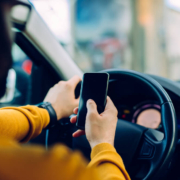How Music and Audio Distractions Contribute to Car Accidents
Music is a core element of our daily lives. We seek it out to make driving more bearable, use it as background noise during work, and encounter it in public. However, music, podcasts, and other forms of audio entertainment can distract your driving. Find out how audio distractions can impact car accident rates, and if you’ve been injured in a crash, let us help. Call Gardner Law Firm at 228-436-6555 to discuss your claim in greater detail.
The Cognitive Effects of Music and Audio
There are three types of distractions, per traffic safety experts: manual, visual, and cognitive. Music and other forms of audio fit into the cognitive category. Even if you aren’t intentionally thinking about what you’re listening to, your mind still filters the information and sounds. That takes attention off of the road and limits your ability to respond appropriately to distractions.
Audio distractions affect your cognitive abilities in several different ways. To start, they have a negative effect on your ability to concentrate. When you are trying to focus on the road but your mind keeps pulling you back to the music or podcast you have on, that makes it increasingly harder for you to actually watch the road.
Audio distractions can also drag down your reaction time, which can be incredibly dangerous when an unexpected obstacle pops up in front of you. Additionally, distractions can have a negative impact on your decision-making abilities. When there’s an issue on the road, one wrong decision can mean disaster.
What the Research Says About Music and Audio Distractions
There’s a range of research on driver distractions and how they lead to accidents. One interesting study focused on how music affected a driver’s safety and performance. In some ways, audio distractions can be beneficial; research found that drivers who listened to their favorite music in traffic felt less aggressive. However, the same research also found that the type of music you listen to can affect your performance.
Those who listen to music with a high tempo, such as rock, some types of rap, or dance music, tend to drive faster than those listening to slower-paced music. On top of that, drivers who chose faster music took more unnecessary risks than other drivers. This put them at greater risk of collisions and illegal behavior, such as running red lights.
Limiting the Impact of Audio Distractions
The fact that audio can be a distraction when you’re driving doesn’t mean you need to cut it out completely. In fact, doing so could actually negatively influence your driving. There’s a significant amount of research that says that listening to music can make drivers calmer and less stressed. This is especially true on long drives, where your natural tendency may be to become fatigued and doze off. You just have to be strategic about what you listen to and how focused you are on it.
Ideally, you’ll want to listen to something that is interesting enough to keep you awake and focused, but not so interesting that you become immersed in it. If you’re wrapped up in a podcast when approaching a red light, you don’t want to be so invested in it that you completely fail to see the light. Additionally, you don’t want to listen to music so fast-paced that you completely ignore speed limits and road signage.
You can protect yourself against the negative effects of audio distractions by knowing your own driving habits and behavior, being aware of how different types of music affect you and being open to feedback from your passengers.
Furthermore, be conscious of the volume of the music you choose. Beyond the fact that loud music can distract you, it can also keep you from hearing more important sounds, such as sirens, horn honks, and your own vehicle’s alarms.
Injured in a Crash Caused by a Distracted Driver? Call Gardner Law Firm
Have you been hurt in a car crash caused by a distracted driver? You could be entitled to compensation. Find out now by reaching out to Gardner Law Firm. Call us at 228-436-6555 or get in touch online to set up a consultation right away.





